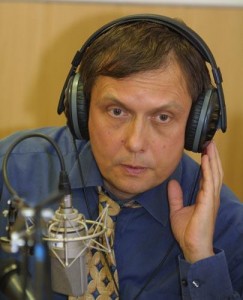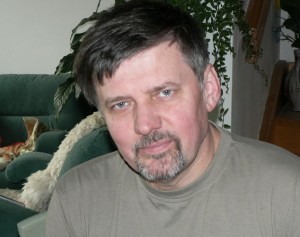Belarus: Interview with Journalists Alexander Lukashuk and Jan Maksymiuk
by Radio Free Europe / January 4, 2012 / No comments
On December 19, Radio Free Europe/Radio Liberty hosted a live interview via Facebook with Alexander Lukashuk and Jan Maksymiuk, two correspondents from its Belarus Service (Radio Svaboda).
The event was held in light of December’s controversial parliamentary elections and protests in Russia, the one year anniversary of the fraudulent re-election of Belarusian President Alyaksandr Lukashenka, and the subsequent violations of human rights that continue in what international media has called “Europe’s last dictatorship.”
This event was RFE/RL’s second live interview conducted on Facebook, following a December 7 chat with two journalists. The events are open to the public, and participants are encouraged to question, comment, and “Like” during the interviews.
RFE/RL: Alexander, you were on Independence Square on December 19, 2010 when protests broke out following the reelection of Alyaksandr Lukashenka. What do you recall most from that day?
Alexander Lukashuk: It was a mixture of high emotion, almost giddiness, when we walked from the Oktyabrskaya Square via the central Minsk avenue, past the KGB building, where opposition put up the national white-red-white flag, and to Independence Square. When the police disappeared, there was a feeling that everything might happen.
Later it was even more surreal, though more predictable. Army, police, special forces came back – like in a Chinese movie when thousands and thousands of warriors in helmets, with swords, all of a sudden start pouring in without end from all directions. And it was bitterly cold as well.
RFE/RL: There are talks of anniversary gatherings happening in Minsk tonight. Do you think these will happen, and if so what might be the reaction from authorities?
Jan Maksymiuk: As we sit here in the chat room in Prague, things are happening in Minsk right now. People who took to the streets to light candles to mark the brutal crackdown a year ago are being arrested. Our colleagues from the service, both in Prague and Minsk, are posting reports on our website. Our colleagues in Minsk have reported about a dozen arrests. Former political prisoner Mikita Likhavid and former presidential candidate Vital Rymasheuski are among those arrested today.
RFE/RL: Congressman Chris Smith, Chairman of the Helsinki Commission, held a press conference on Belarus within the last hour and stated, “It is high time to hold Lukashenka and his henchmen accountable for their reprehensible, despicable treatment of those who defend human rights and struggle for their country’s freedom. On this sad anniversary, we reiterate our demand for the immediate and unconditional release of Andrei Sannikov, Mikalai Statkevich, Zmitser Bondarenka, Zmitser Dashkevich, Ales Bialatski and others imprisoned for exercising their fundamental rights.” One question is, how long can the Lukashenka government sustain this strategy and keep on arresting people?
Alexander Lukashuk: It’s been already almost 17 years. First opposition members of parliament were beaten by special forces in 1995, then high profile opponents started to disappear – they were kidnapped and killed – then arrests and imprisonments. Lukashenka will not change. Chances for uprising in Belarus are like those for uprisings in a concentration camp – with the same chances for victory. The West can’t change him. As long as Russia supports him, he will be able to stay in power. And Russia needs him. Congressman Smith has for a long time been doing what Vaclav Havel had been doing – speaking for Belarus.
RFE/RL: This is a public chat, so feel free to post your questions on the wall. We don’t want it to be just RFE/RL asking questions, we want to hear from you!
Vladimir Vedrashko (Editor in Chief of Human Rights Publishers): What are the strongest and the weakest legs of support for the Belorussian regime?
Jan Maksymiuk: The strongest supporter is Russia, of course, and Alexander already mentioned that. As for Lukashenka’s weakest points, I think there are at least two of them: The deteriorating living standards in Belarus, and an ever shrinking space for his political maneuvering. It seems that both the EU and US are not going to do anything for Lukashenka before he releases political prisoners and makes some apologies… But you never know. Who could say back in 1994 that he would be able to keep himself afloat for more than 17 years?
Alexander Lukashuk: It’s a police state. Internally, it has created a stable system of support: Bizzare legislation that now outlaws even “doing nothing”, full mass-media control, police forces who, as Lukashenka said, shouldn’t think about morals because this is his issue, and an economic system that enslaves workers and teachers. It can go on quite some time like this. Think Cuba, North Korea, Zimbabwe…Think Central Asian states…
RFE/RL: Are there any links we can draw between the protests ongoing in Russia and the events in Belarus?
Alexander Lukashuk: I think in both cases the driving, underlying force is dignity. People don’t want to be treated as sheep, and they want their freedom and dignity – otherwise what’s the point?
Jan Maksymiuk: One aspect of the Russian protests is especially telling if you compare them with the events in Belarus. Russian police officers work very hard not to look uglier than their Belarusian counterparts…
RFE/RL: Jan’s comment is bearing out. Testimony in Congress last week cited the “relative restraint” of Russian police in dealing with their protesters.
RFE/RL: Ok, here is where you can get really creative in your answers: What’s next for Belarus? What will we be discussing one year from now?
Jan Maksymiuk: I think there may be some warming in relations between Minsk and Brussels. Lukashenka will say he’s sorry and the EU will only be too glad to accept his apologies. What else can they do? They don’t have as much money to spend on him as the Kremlin does…
Alexander Lukashuk: Perhaps Russia’s Medvededv will be out of work and will be appointed as the next president in Minsk. And we will chat on Facebook with him.
RFE/RL: Alexander and Jan – Thank you so much for joining us today with your insights on Belarus. We encourage everyone to continue to follow breaking news and to tune in soon for our next chat with RFE/RL journalists.
This event was originally published on Facebook by Radio Free Europe/Radio Liberty.
Copyright (c) 2011. RFE/RL, Inc. Reprinted with the permission of Radio Free Europe/Radio Liberty, 1201 Connecticut Ave., N.W. Washington DC 20036.







